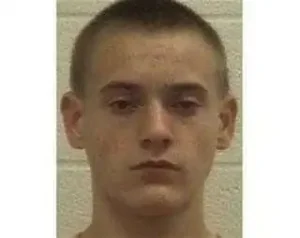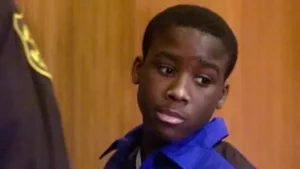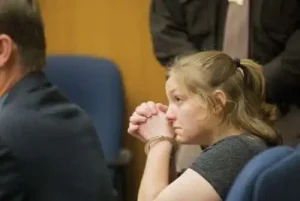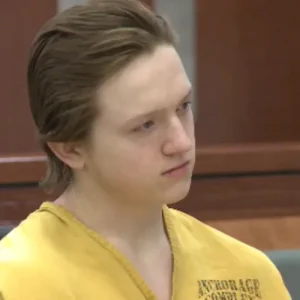Mary Bell was ten years old living in the United Kingdom when she murdered for the first time
According to court documents Mary Bell was just shy of her eleventh birthday when she would strangle a four year old boy.
Mary Bell and a friend Norma Jean Bell would break into a nursery three months later and Mary would murder a three year old boy
Apparently the two murders were just to serve Mary Bell curiosity
Mary Bell would be arrested, convicted and sentenced to life in prison however she would later be released and the UK government would protect her identity and that of her child’s so little is known about her life after prison
Mary Bell Photos
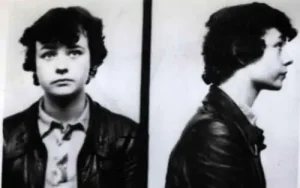
Mary Bell News
Fires can be difficult to light, but once started, they are hard to control. Over the past week, a great fire has been burning, ignited when The Observer broke news that Gitta Sereny had collaborated on a book with Mary Bell. It has been fanned by the press, the Government, the families of Mary Bell’s victims and the writer of Bell’s life for their own particular gains.
Now it is like a forest fire, feeding on everything in range. Each day brings fresh and appalling revelations of tragedy and greed, of depravity and hypocrisy. In the hunting of Mary Bell, everyone has used everyone else and blamed everyone else – except for one mute and powerless individual, Mary Bell’s teenage daughter, who until the early hours of Wednesday morning knew nothing of her mother’s past and now must be in fear of her own future.
Thirty years ago, on 25 May 1968, four-year-old Martin Brown was strangled by 11-year-old Mary Bell . At the time, it was unclear how he died and an open verdict was returned. He was buried in an unmarked pauper’s grave, where his mother still leaves flowers. Three months later, on 31 July, three-year-old Brian Howe was murdered by Mary Bell . His body was discovered in scrubland, concealed by flowering weeds.
The fact that an 11-year-old girl could have murdered two little boys electrified the country. The details that emerged at the trial made the story all the more perverse: how gently Mary had strangled the two boys, massaging their necks how afterwards she had pestered the mothers, wanting to see Martin in his coffin, to know what it felt like to lose a child how she had written graffiti-confessions on the wall of a nursery.
Mary’s co-accused, Norma Bell (no relation), was acquitted. Although two years older, she was deemed to be a passive partner a slow-witted, fragile girl led astray by her quick, devious partner. Her reaction to the trauma seemed normal: she cried, stumbled in her speech, was uncomprehending. Her escorts hugged and comforted her. She was just a little girl.
Mary Bell , on the other hand, stood terribly alone during the trial: tearless, defiant, bandying words with the prosecution, apparently untouched by remorse, certainly not touched by those around her, never hugged and held. With a kind of relief, the public could name Mary Bell as a freak of nature, a sweet-faced chilling monster. Her extraordinarily pretty, heart-shaped face looked out beneath headlines, as it looks out again now: a beautiful icon of evil.
Mary Bell was not found guilty of murder, but of manslaughter on grounds of diminished responsibility. The public reaction was appalled yet also fairly restrained: there was a sense of social responsibility and acknowledgement of social failure. She had had an devastating childhood herself: her increasingly despairing cries for help had gone unheard. After the trial, she was named both monster and victim.
Mary Bell served 12 years for her crime, in secure units and in prison. The only girl among 20 or so boys at an approved school in Merseyside, she was allegedly subject to sexual abuse by a member of staff and also by fellow inmates, to which the rest of the staff turned a blind eye. Unsurprisingly, she was often a mutinous prisoner, once escaping to a renewed flurry of press attention.
For 18 years she has been free, deemed by law to have paid her debt to society. She was given a new name and the possibility of a new life. Her disappearance into unknown freedom and silence allowed the families of the two murdered boys also to have the possibility of a partial freedom from their past hell. ‘For me,’ said June Richardson, the 53-year-old mother of Martin Brown, in an interview with The Observer last week, ‘ Mary Bell died when she left prison and took on a new identity. I thought of her as dead I tried to have a decent life. I started to learn not to hate her, because she had died and become someone else. Now Gitta Sereny has resurrected her. Why?’
Sereny has resurrected her into a less forgiving society, it seems one which behaves as if the passage of time and the process of law stand for nothing. As with the James Bulger trial, as with the furore over the released paedophiles, the lynch-mob mentality and tabloid-sensibility reveals a terror and irrationality that is reminiscent of the time of witches. Sereny’s book, with its emphasis on Bell as victim of childhood abuse, demands our compassion not our fear and loathing. But she has reckoned without the press and New Labour’s courtship of the tabloids and public opinion. Sereny has been, at the very least, nave in her payments to Mary Bell , and unconvincing in her claims to be uniquely above the moral ambiguities of the case. Sereny often presents herself as if she were a scientist, a psychoanalyst or an unimpeachable moral authority. She is not. She is a journalist, publishing her work to coincide with the thirtieth anniversary of Martin Brown’s murder, earning substantial money from it, defending her work as in the public interest yet refusing interviews with the press because of her commercial deal with the Times, which is serialising the book. In her letter to the victims’ families she writes that she paid Mary Bell because she did not want to ‘use’ her – but of course she has: she is a writer with a scoop. And she has failed adequately to prepare herself and her subject for the storm that the book has unleashed.
Two weeks ago, The Observer revealed that Sereny had collaborated with Mary Bell on Cries Unheard. Reaction was at first predictable. Newspapers questioned whether the murderer should profit from her crimes leading articles covered the ethical dilemmas raised by Bell’s case. One paper put the figure paid to Mary Bell at pounds 50,000 – about three times the actual amount, as we reveal on our front page today – but only one fifth of the pounds 250,000 that the German magazine Stern is offering.
The mothers of the victims, who had only discovered about the book through The Observer’s original article, entered the fray, demanding that the money be given to charity. The victim has great power in our society we tend to think suffering confers moral authority, and that because the two bereaved mothers continued to grieve, Mary Bell should continue to be punished. This voice of acute personal sorrow threw petrol on the flames. The story became venomous and hysterical. Arrogance and greed masqueraded as morality under banner headlines. Journalists fastened on to the mothers’ grief. Ethical shades of grey were blotted out by black and white.
Mary Bell was released from the Risley remand centre 18 years ago and, ever since, has been hunted by the tabloids. The ‘ Mary Bell Order’ – a court ruling that protects her identity for the sake of her daughter – has not stopped journalists from stalking her as she moved from town to town, nor from offering her large sums of money to tell her story. Four years ago, amid the furore over the Bulger case, she was traced by reporters and forced once more to change her name. Two weeks ago, editors could not justify such stories in the public interest. But with the row over payment for her collaboration with Sereny, the witch-hunt began anew.
The two richest newspapers – the Sun and the Daily Mail – set off in pursuit of the 41-year-old mother. Her new name, it appears, was provided by police sources. By last Tuesday they had tracked her down. The Mail pulled out of the chase at this point, leaving the Sun to claim the tabloid triumph.
Bell and her family had been living in a south coast resort for 18 months. Their home had been a small flat overlooking the sea but, using the proceeds from the book as a deposit, they had just moved into a Victorian terrace. The house is perched on a hillside, on a road rumbles with passing lorries. It has been freshly painted, sparsely furnished, quickly abandoned.
Last Tuesday morning, Ian Hepburn from the Sun knocked on Bell’s door. Her partner mistook him for a man from the Inland Revenue. He and Bell refused to talk to him. More reporters gathered as Bell and partner hid. By midnight, the police were called. In the early hours of Wednesday morning, Bell and her teenage daughter were taken to a safe house by undercover officers.
By the next morning, there was a media siege outside the house. A 70-year-old neighbour says: ‘The first thing we noticed were men in suits wondering up and down the road. We initially thought it was to do with the local elections. We realised they were reporters when they asked me if I knew who lived opposite. There were about six cars with reporters moving up and down and a white surveillance van.
‘At first,’ said this neighbour, ‘you feel excited. But then you realise it’s all about the murder of children, and you feel disgusted.’
Bell’s partner – a 40-year-old Geordie with a ponytail, tattoos and a lived-in look – certainly gave reporters value for money. He walked to the beach, followed by a posse of cameramen, took off his shoes, paddled and cried. Later, in a dingy bar, he drank whisky and beer and poured his heart out, into a series of headlines: Mary was the most gentle person he had ever met he loved her so much it hurt to be parted she had always wanted to work with children.
The Government has been quick to join the chorus of condemnation, although by the end of the week there were signs that it was starting to wonder if it had become too closely identified with one side. The tone was set when, one week ago, Downing Steet chose to express Tony Blair’s outrage through a tabloid newspaper, the Mail on Sunday. On Wednesday – the very day the Sun was trumpeting its success in tracking down Bell – Blair was twice asked about the case: once during an interview broadcast on the Internet, and once in the Commons, directly after an acrimonious exhange about trade unions with William Hague, in which both appeared to be vying for the support of Rupert Murdoch.
His line was that ‘most people would find it repugnant that anyone should benefit from crimes as heinous and appalling as those’. There was not a word about the tabloid pack beating a path to Mary Bell ‘s door, but the Prime Ministers defenders argue that – unusually for a politician – he was simply answering the question he was asked.
On Thursday, Jack Straw joined the campaign in the Murdoch press by penning an open letter in the Sun to the mothers of the two dead boys. On Radio 4’sWestminster Hour, the Home Secretary, interviewed by The Observer’s Andrew Rawnsley, suggested that by co-operating with Sereny, Bell may have compromised her anonymity. This may have finally given the tabloids the confidence to violate the ‘ Mary Bell Order’. He was clearly irritated that after the State had gone to so much trouble and expense to protect her and her daughter’s anonymity, she should make such a rash step without warning her protectors. A few days later, he was embarrassed to discover that officials had been told they simply had not told Ministers.
Moreover, fellow Ministers say the Home Secretary will always react in a crisis such as this by asking himself ‘what about the victims?’ It was left to greyer, more inconspicuous politicians to ask: ‘What about the law?’
The Official Solicitor, Peter Harris, is the guardian of Mary Bell ‘s daughter, and his duty is to protect her. Yet only after the girl and her mother had left home did the Government appear to notice that there was more than one set of victims in this unhappy tale. On Friday, the Prime Minister’s official spokesman told journalists that the payment to Mary Bell and the hounding of her by journalists were ‘equally bad’. However, all the actions which the Government has planned are directed at answering the complaints of the grieving parents. The Home Office is examining the law to see whether it could be made illegal for other offenders to be paid for their stories. Few dare suggest that perhaps it is not immoral for Mary Bell to be compensated for the time she gave Sereny.
Probably the media fury would have erupted whether the money had been paid to Mary Bell or not. Claire Alexander, Macmillan’s editor-in-chief, says the money is ‘nobody’s business’. She adds that Bell herself, who might have thought she was exorcising some terrible nightmare in talking to Sereny, perhaps thought ‘that there would be a climate of understanding’. Certainly, in the serialised extracts of Cries Unheard, Bell speaks to Sereny as she would to a therapist or a confessor. We live, after all, in an age when journalism has replaced the confession box.
All her working life Sereny has been interested in the terrors of the Third Reich and in troubled children – interested in probing darkness. In 1968, she covered the Bell trial. In her first book about Mary Bell , published in 1972 and revised in 1994 on the heels of the Bulger case, she writes that children who kill are produced by unhappiness, and that unhappiness is not innate but created by adults.
But one of the criticisms levelled at Sereny is that she lacks empathy for the primary victims. The murderer, whether Mary Bell or Albert Speer, is the leading character and everybody else, including the victims and their families, is relegated to a supporting role. Bell is like a literary character – too interesting for a writer like Sereny to ignore. Some think that now Sereny has gone too close to the flames and that in the heat of discovering Mary Bell , lost sight of Bell’s victims.
June Richardson and Eileen Corrigan have never lost sight of them. They live on in their memories, vivid. Although the two mothers lived very near each other in Newcastle, they never met – until a few days ago when they came together to protest against the book. They did not meet at the trial – Eileen Corrigan was too ill to attend. Both women’s marriages broke up both moved from their houses as if they could move from the past, and, like Mary Bell , changed their names both staggered through the first months of bereavement in a haze of tranquillisers and, in June Richardson’s case, alcohol, then through the next three decades in a more invisible, muted pain.
Like Mary Bell, they hid from the press. Like her, they did not talk to their families about what had happened (their grandchildren never knew until last week that they had a dead uncle). In June’s neat little house in Gateshead – just beneath the widespread arms of Gormley’s giant Angel Of The North – there are no photographs of her lost boy, only dozens of cheerful china ornaments and cups that her second husband has won for his leeks. Eileen has one picture of Brian – a tiny faded square that she cut from a newspaper all those years ago and carries round in her purse. She shows it to me: ‘People used to think he was a girl,’ she says, fretfully. It’s a phrase she will repeat several times. ‘I always wanted a girl.’
June thumps her fist against her chest. ‘Martin was blond, chubby, had big blue shining eyes he was a right little villain. I only had him for four and a half years, so I remember everything about him – I don’t do that with my two daughters because I’ve had them for longer. But when you’ve lost a child, you never forget a thing. I never gave up those four and a half years, not even with all the pain. Now all the pain has come back again with this book. Fresh grief. It kicks in.’
‘It kicks in,’ echoes Eileen. ‘All over again.’ June furious at the payment: ‘Is she buying food, buying clothes with money made out of Martin’s death? How can she enjoy this money? How can she bring herself to spend it? The one payment I got I gave to a charity for victims. It wasn’t mine to have. And she is jeopardising the safety of her own 14-year-old daughter. Her daughter should be priceless. I am going to shame the money out of her.
‘But as far as I’m concerned, Gitta Sereny is as much to blame: she dangled a carrot in front of Mary Bell’s nose.’
On the morning that The Observer met the two women they had received the now notorious hand-delivered letters from Sereny. She claims she had not contacted them before because she had been unable to track them down (this, remember, is a distinguished investigative journalist) she says of the payment that she could not do to Mary Bell what had always been done to her in the past – ‘use her’ – and insists that the dead boys and their families have not been out of her mind. June tosses the letter on to the sofa. ‘It is an insult to my intelligence. What does she want me to say? Does she want me to say it is all right?’
They are very different women. June Richardson is robust, crumpled and warm: a strong handshake, a firm gaze, a burry smoker’s voice, a rueful laugh. She is articulate, emotionally strong. She calls me ‘flower’ she calls Eileen ‘my love’, and is protective and solicitous towards this figure bunched on her sofa, smoking and scrunching her eyes in puzzlement. Where June seems abreast of her enduring grief, is adrift in hers. ‘She’s the strong one’, Eileen keeps saying. ‘I’m ill, not strong.’ She follows the conversation on June’s coat tails, chiming in with agreement, relieved to find someone who will give her words. ‘That’s like me,’ she keeps saying. ‘You’re like me, June.’ Eileen can hardly remember the past, as if for 30 years she has been living in a fog of illness and uncomprehending misery. (She has received no counselling neither has June).
She insists Sereny was ‘plain wrong’ when, in The Case of Mary Bell , writing that Eileen Corrigan (then Howe) had left her family 18 months previously. ‘I would never have left my boys.’ She was shopping with her mother, she says, on the day Brian was killed. Her husband insisted she should not attend the trial (‘I am an epileptic. He thought I wouldn’t bear it’) she cannot remember the funeral, and thought she hadn’t gone until her brother told her she had. ‘I was full of drugs,’ she says.
She left her husband a year later (‘nothing was working . . .’), and, taking her two remaining sons, moved in with a friend. She met the man who was to become her second husband. Her youngest boy was taken into care (‘I wasn’t well, I couldn’t, it didn’t . . .’).
The eldest moved between her home and his grandmother’s, then went into the Army. For 14 years she didn’t see him at all. Now they are in contact again, the tentative beginnings of new family life. She says Bell took away her life she remembers Brian, especially in her dreams. ‘I see his bonny face, he was like a little girl. Curly blond hair. Every parent thinks their bairn is beautiful, but he was beautiful.’
‘Of course he was beautiful, my love’, says June. ‘They were both beautiful little boys, little terrors.’ They smile at each other, remembering.
June remembers everything as if it were yesterday. She remembers getting Martin up on his last morning. ‘How dare Gitta Sereny write that he had no sheets, only blankets – he had wet his bed that night and I had washed his sheets but I never got to put them back on, did I,because he was never to sleep in that bed again. She made out it was a deprived childhood my Martin had, when he was so looked after. We had a lovely house, cherry trees in the back garden and a laburnum out front.’
She remembers him eating breakfast on his last morning and then rushing out to find a second breakfast (‘Eating was his main hobby’). She remembers seeing him dead – being guided by Bell into the derelict house where he lay, and how she couldn’t even hold him, and how he was ‘grey, lifeless his mouth full of sawdust’. She remembers how Bell came around and asked to see Martin and when she replied – bewildered – that he was dead, Mary said she knew that, she wanted to see him in his coffin.
June had a daughter, Linda, who was 18 months old when Martin died. ‘I couldn’t look after her. I don’t know what would have happened to her without Mam and Dad, and my husband George. But he had no one to support him. We tried not to but we blamed each other. Every time we looked at each other we thought about Martin. We had another child, Sharon, but she was the last attempt to get closer. We separated. He lost three children really.’
June Richardson lived through years of drinking and drugs she would lie in bed in a stupor, with her children running around uncared for.’ Poor little mites,’ she says, as if she wants to reach back into the past and hug them better. ‘Poor things.’ She was terrified of loving them too much in case she lost them, so she stopped cuddling them. When anyone knocked at her door she feared it was the press and cowered with the children behind the sofa, stopping up their mouths so they wouldn’t breathe a word. She tied them with clothes line in the garden, like dogs on a leash. She refused to let children over the age of six in the house. ‘I made them into prisoners.’ With Martin and Linda, she says, love ‘came so easy. I oozed with love. Now I was terrified. Full of hate.’ Twenty years after Martin died, her first grandchild was born and when she leaned over him, she thought: ‘I can’t stick hate into this wee bairn. It wasn’t exactly forgiveness, that’s hard, but I came to think of her (Bell) as dead, as someone who couldn’t hurt us any more. But now I’m afraid it will return: hate. I have tried to have a decent life and sometimes now I do feel happy – but it is not the same kind of happiness as I knew before. When a child dies you don’t get over it you survive. The pain doesn’t go away you live with it. I knew Mary Bell would get out one day, and when she did I thought: ‘As long as she keeps her head down, it will be all right’ and then I just kept thinking of her child, the girl, who’s done nothing wrong. I don’t wish her anything but good. That’s what I don’t understand – how Mary Bell can jeopardise what she has, her bairn. For what? Money?’
But perhaps Mary Bell is a victim as well? Eileen shakes her head. ‘I hate her.’ But June nods: she supports rehabilitation, forgiveness is part of her moral culture. If she is unable to forgive Mary Bell , she would not want to do her harm. She is not in favour of censorship, she just thinks that money should not be made out of her son’s death, and the fact that Mary Bell will take the money makes her think she cannot be ‘cured’. Eileen agrees: ‘She must still be sick, if she takes that money. There’s something loose somewhere. If she was cured, she would not be able to bear the money. What is the word remorse supposed to mean? And how can she accept the anonymity and the new life, and then contribute to a book and take money. That’s having it both ways.’
When the fire burns itself out, Blair will be all right Straw will be all right the papers will be fine, their circulations sustained Sereny will go on to write other books. Some people, however, will not be all right: June Richardson and her family, Eileen Corrigan and hers, Mary Bell and her daughter. Amid the arrogance, the corruption, the hypocrisy and the greed, we ought to hold fast to the profound grief in the Mary Bell story. Thirty years ago, a damaged and despairing child murdered two small boys and wrecked their mothers’ lives. Now, she and her daughter have become victims once again, and so too have the families of Martin Brown and Brian Howe. We have created a new generation of victims. Somewhere out there is a 14-year-old girl, on the brink of adulthood, whose present has been smashed. And somewhere back there in time, are two children who never had their future.
‘A few nights ago,’ says June, ‘I dreamt about a little boy in a blue anorak (her son was wearing a blue anorak on that last day) and I am trying and trying to turn him round so I can see his face, but I can’t. I want him back so badly and I can’t get to him. I can never see his face properly he is always just out of sight.’
‘I can see my Brian’s face in dreams.’
‘I can feel Martin’s hair, though, the way it felt silky going through my fingers.’
‘I remember Brian in his pram.’
‘I used to wait for Martin to come through the door. For months and years after it happened, I would wait for him.’
‘The shock, you think it can’t be happening to you.’
‘I’d think, any minute, Martin will pop his cheecky face round the corner. Or I’d see him at a window. Smiling. Or feel him tugging on my back pockets, like he always used to do.’
‘I would see boys running along the road and I’d look for my Brian to be there too, running along.’
‘I’ve even gone out looking for Martin, night after night. I knew he was gone, yet I thought I could find him.
‘Sometimes I imagine how he’d be today. Thirty-five.’
‘Thirty-four Brian would be.’
‘You have to keep the memories. That’s all you’ve got. You’ve got to hold on.’
https://www.theguardian.com/observer/focus/story/0,6903,688106,00.html
